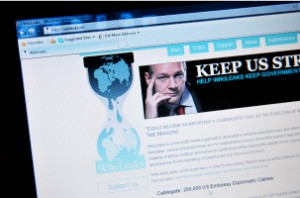
Most people know the what about Julian Assange and WikiLeaks – that they publish secret information – but they don’t know the why. And that’s a great loss, because the reason behind all the leaks is both brilliant and illuminating.
It Usually Starts with the Cypherpunks
The first thing to understand is that WikiLeaks, like Bitcoin, came from the cypherpunks. In particular, WikiLeaks was spawned by a cypherpunk group that formed (spontaneously) in Melbourne, Australia.
In other words, WikiLeaks is the creation of some smart guys who were inspired by Timothy C. May, Eric Hughes, Murray Rothbard, and a few others. Assange was part of this group and an intriguing thinker in his own right.
Assange explained what WikiLeaks would be doing, and why, back in 2006, and you can still find copies of that work here[1]. Given the worldwide recognition of WikiLeaks, it’s a little crazy that this is so little known and discussed, but I’ll do my part to change that condition.
The Core Ideas
Assange starts out by describing modern governance as conspiracy. He invokes Teddy Roosevelt, who said, “Behind the ostensible government sits enthroned an invisible government owing no allegiance and acknowledging no responsibility to the people.”
Assange calls these conspirators “neocorporatists,” referring to the entire complex of legislators, bureaucrats, and the corporations who purchase laws from them.
He goes on to describe them as existing in elaborate networks, a theme that Jonathan Logan and I examined in The New Age of Intelligence and that was the subject of a landmark study in 2011 by Vitali, Glattfelder, and Battiston, entitled The Network of Global Corporate Control.
These networks – the real power behind the apparent power – are WikiLeaks’s actual targets, not the governments they may seem to be addressing. This is the first thing to understand about WikiLeaks.
What Assange wants to affect is communication inside these networks. This passage explains why fairly well:
[W]e see conspiratorial interactions among the political elite… the primary planning methodology behind maintaining or strengthening authoritarian power… these plans are concealed by successful authoritarian powers.
WikiLeaks was designed to hurt power that hides its intentions.
But merely unmasking those intentions is not the goal; Assange, brilliantly, goes after something deeper than that.
Preventing Obscured Power from Using Power
Assange writes:
Not every conspirator trusts or knows every other conspirator even though all are connected. Some are on the fringe of the conspiracy, others… [may] be a bridge between important sections or groupings of the conspiracy.
He goes on to say that such a network can be disrupted by “distorting or restricting the information available to it,” by “unstructured attacks on [its] links,” by dividing the network by cutting links. Then he adds this:
A conspiracy sufficiently engaged in this manner is no longer able to comprehend its environment and plan robust action.
This is Assange’s goal: He wants to stop the “conspiracy” from trusting itself.
The goal of WikiLeaks is to prevent a network of this type from communicating with itself.
So, when WikiLeaks publishes the Democratic National Committee’s dirty secrets (to pick just one example), it’s not trying to drive public outrage, as reasonable as that might be. Rather, it’s trying to make the conspirators distrust each other, and especially to distrust their communications, because if those links go, networked power goes with them.
And It Gets Even Better
I hope you can see how brilliant the WikiLeaks strategy really is. They’re not reacting after the events, as in exposing dirty laundry. They are acting in advance, disrupting their enemy’s ability to function in the future.
And here’s where it gets even better: A network of this type invariably reacts to leaks by closing itself tighter against untrusted links. And so, by closing itself off from intrusion, the network becomes less and less able to engage with anything outside itself. And the less it engages with things outside itself, the less it can enact power outside itself.
Once the obscure conduits of elite power become so paranoid that they can no longer conspire among themselves, WikiLeaks has won. As Assange writes:
The more secretive or unjust an organization is, the more leaks induce fear and paranoia in its leadership and planning coterie… in a world where leaking is easy, secretive or unjust systems are nonlinearly hit….
What Led to This?
As noted above, I find this a brilliant strategy. More than this will be required to bring our world out of its current barbaric age, but this is a fascinating and important part.
Before I close, I’d like to aquatint you with the mindset that produced this. And so, here is an edited passage from Assange’s book, Cypherpunks: Freedom and the Future of the Internet:
The new world of the internet longed for independence. But states and their friends moved to control our new world. They leached into the veins and arteries of our new societies, gobbling up every relationship expressed or communicated, every webpage read, every message sent and every thought googled, and then stored this knowledge, undreamed of power, in top secret warehouses, forever.
And then the state reflected what it had learned back into the physical world, to start wars, to target drones, to manipulate UN committees and trade deals, and to do favors for its vast network of industries, insiders and cronies.
If this isn’t the kind of world you want, I encourage you to get busy creating a better one. Watching and complaining will never give you what you want.